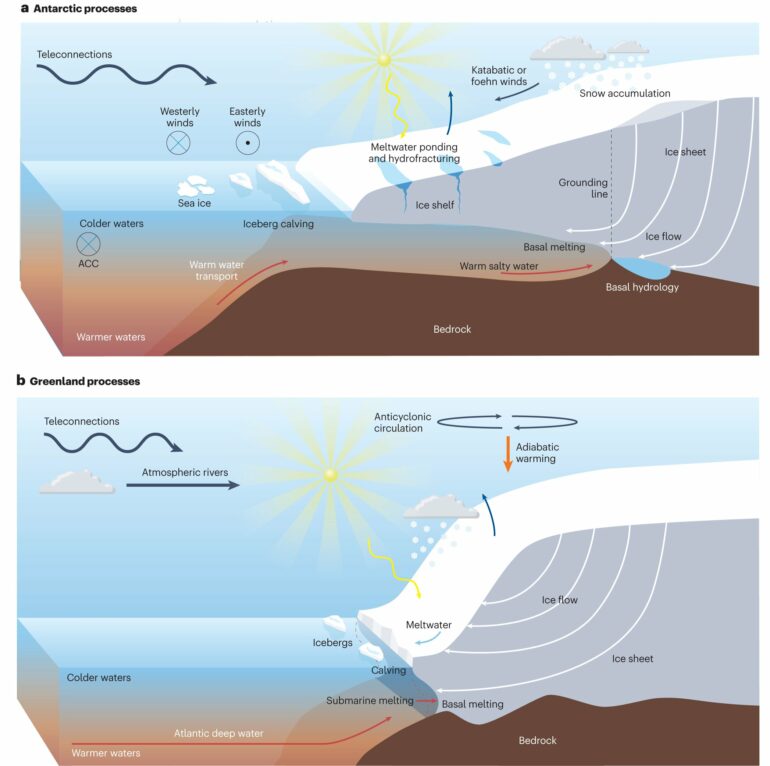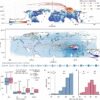An innovative scientific study involving an international group of 29 ice sheet experts, and led by the University of Lincoln, U.K., has identified that global climate change-related rises in sea level could be better predicted by gaining a clearer understanding of the Antarctic and Greenland ice sheets.
As one of the most pressing issues of our time, climate change has caused significant rises in sea levels. Trying to accurately predict just how much they will rise in the future is subject to ongoing analysis. A crucial factor in the projection of future sea level rise is the acknowledgment of the changing nature of the ice sheets.
It was previously thought that ice sheets, the gigantic stores of ice in Antarctica and Greenland which lock up sea water, equivalent to an increase of 65 meters of global sea level rise, were relatively static, slow-moving, and slow to respond to climate change. However, the paper illustrates that these huge glaciers respond in far quicker and unexpected ways as the climate warms, in a similar way that the frequency and intensity of hurricanes and heat waves changes with the climate.
Ground and satellite observations, and the development of climate models demonstrate that sudden heat waves and large storms can have long-lasting effects on the ice sheets. This weather fluctuation can lead to extreme melt events, such as the Greenland ice sheet melt in July 2023, or cause ice shelves to disappear almost overnight, as with the Antarctica Conger Ice Shelf collapse in 2022.
Published in Nature Reviews Earth & Environment, the research discusses the demand to monitor short- and long-term timescales of changes in ice sheet behavior, to reduce uncertainty in future sea level rise projections.
The study highlights that predictions of sea level rise could be refined, to better prepare for the impacts of climate change. Glacial masses are subject to short-term fluctuations and extreme events across a wide range of timescales, from days to thousands of years, and as a result diverse knowledge should be gathered.
The international team of interdisciplinary scientists, led by Edward Hanna, Professor of Climate Science and Meteorology at the University of Lincoln, undertook a review of evidence gained from observational data, geological records, and computer model simulations.
A prominent aspect of the review indicates that short-term fluctuations in climate could have an amplification “feedback” effect, meaning that ice sheets are more sensitive to climate change than previously understood.
Edward Hanna, Professor of Climate Science and Meteorology at the University of Lincoln, said, “How the giant ice sheets of Antarctica and Greenland respond to ongoing climate change is crucial for determining the rate of sea-level rise over the next few decades and centuries.
“Ice sheet mass loss is not a simple uniform response to climate warming but is punctuated, for example, by short-term (typically several days) extreme melting events and by the catastrophic break-up of ice shelves along the coast which can occur rapidly unplugging much larger amounts of ice from further inland.
“However, the patterns, processes and impacts of ice sheet variability on different timescales from days through to millennia are not well understood. Failing to account for such variability can in turn result in biased projections of multi-decadal future ice sheet mass loss. The time to act is now, and improving projections through collaborative efforts will help us pave the way for a more sustainable future.”
This review serves as a call to action, urging the scientific community to prioritize research efforts that will enhance the understanding of ice sheet variability. It is crucial that scientists, policymakers, and stakeholders collaborate more closely to improve climate and ocean monitoring systems, refine models, and ensure that ice sheet models accurately represent the observed changes, the research suggests.
More information:
Edward Hanna et al, Short- and long-term variability of the Antarctic and Greenland ice sheets, Nature Reviews Earth & Environment (2024). DOI: 10.1038/s43017-023-00509-7
Provided by
University of Lincoln
Citation:
New study could improve predictions on rising sea levels (2024, February 8)



